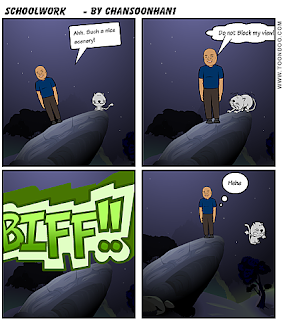
This poster is not very convincing and does not effectively encourage people to join a car-sharing club. The poster has the words "When you ride alone, you ride with Hitler", and there is a picture of a man in a car with Hitler by his side in the background. The poster wanted to encourage more people to join a car-sharing club through arousing their hate for Hitler.
It wanted to convey the message that riding alone in a car is similar to Hitler sitting in the car with the driver. As many people disliked Hitler and does not want to have anything to do with him, they would naturally want to avoid driving alone. However, the poster would not be very successful.
Driving alone has no connection to having Hitler sitting by your side. The two scenarios are totally unrelated so people may not take the message of the poster strongly, since it has committed the fallacy of post Hoc by trying to link the two unrelated issues together. Thus, the poster is not a very convincing or successful one.

The poster has a criticising tone towards president Barrack Obama and wanted to show that he is arrogant. The aim of this was to get people to stop supporting Obama and vote for the opposition parties.
The poster shows Obama holding his head high, and seem to look down on the people. The word "Snob" is in front of Obama and is used to imply that Obama is arrogant and proud. There is also the words "it's an elitist thing, you wouldn't understand" at the bottom of the poster. This appears to be said in Obama's voice, suggesting that Obama is being proud by calling himself an elitist, and does not respect other people.
The poster uses both visual image and words in order to convince viewers that they should stop supporting Barrack Obama as president, as he is very arrogant.

This poster encourages soldiers to stick to their food rations, and avoid taking more than their fair share. It wanted more soldiers to become satisfied with their food rations and not take more than enough, in order to ensure enough food for everyone else.
There are the words "Do with less so they'll have enough" on the top of the poster with an emphasis on the word "they'll". This wanted to convey the message that soldiers to stick to their regular food rations to avoid a shortage of food for their fellow soldiers. There is an emphasis on the word "they'll" in order to remind the soldiers of their fellow friends who are also fighting with them, so that they will become more considerate and avoid taking more food at the expense of others.
Additionally, the background shows a soldier holding a cup containing his rations. The soldier is smiling and appears to be satisfied with his food rations. It wanted to tell soldiers that they should be happy with their food rations and not ask for more, as it is enough. Thus, the poster wanted to encourage more people to stick to their food rations and not take more than that.

This poster wanted to encourage more Americans to continue the fight against the Japanese during World War 2, in revenge for the other Americans that the Japanese killed.
The poster actually show a newspaper article about the Japanese torturing and killing as many as five thousand and two hundred Americans in the war. Additionally, the background of the picture shows an American being brutally beaten by a Japanese soldier. There are also other Americans being forced to march by other Japanese soldiers. This shows some of the ill-treatment by the Japanese towards American soldiers. The aim of this was to stir up anger among the feelings of fellow Americans, and wanted them to fight the war in revenge for their fellow countrymen.
Additionally, there are the words "What are you going to do about it?", with an emphasis on the word "you". The aim is for the people to have a reaction to the poster, for them to do something about the war - to join in the fight against the Japanese. It wanted them to take some action after looking at the outrageous facts of how fellow Americans were treated. The words "Stay on the job until every mudering Jap is wiped out" also further prompted them to support the fight against the Japanese in the war. Therefore, it managed to convey the message for Americans to join in the fight against the Japnese in World War II.

This picture has a very convincing tone to encourage more Singaporeans to enrol in the army. It conveys the message that one would become more decisive, strategic, and will also gain leadership skills if that person joins the Singapore army.
The poster actually shows a scene of the Singapore armed forces in action. There is evidently a leader in front of the rest of the soldiers and he is giving them certain hand signals. The leader looks very impressive with the other soldiers following his order without question. There are also the words strategy, leadership and decisiveness in the poster, suggesting that one would gain these qualities if they join the army.
Additionall, there are the words "Some things you just can't learn in a classroom", suggesting that there are much more things to learn in the army. It encourages one to venture out of their "classrooms" and experience life in the army first hand. It convinces people that in order to gain certain qualities, one must join the army and learn from there.
With the combination of the impressive picture and the influential texts, the poster is very effective in convincing people to join the Singapore army.







